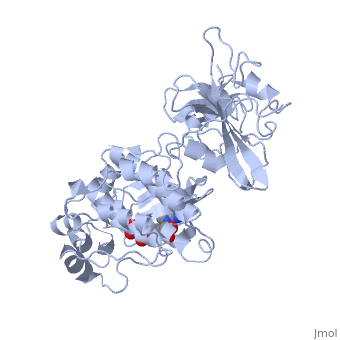2src
From Proteopedia
| Line 1: | Line 1: | ||
| - | [[Image:2src.gif|left|200px]]<br /> | + | [[Image:2src.gif|left|200px]]<br /><applet load="2src" size="350" color="white" frame="true" align="right" spinBox="true" |
| - | <applet load="2src" size=" | + | |
caption="2src, resolution 1.5Å" /> | caption="2src, resolution 1.5Å" /> | ||
'''CRYSTAL STRUCTURE OF HUMAN TYROSINE-PROTEIN KINASE C-SRC, IN COMPLEX WITH AMP-PNP'''<br /> | '''CRYSTAL STRUCTURE OF HUMAN TYROSINE-PROTEIN KINASE C-SRC, IN COMPLEX WITH AMP-PNP'''<br /> | ||
==Overview== | ==Overview== | ||
| - | Src family kinases are maintained in an assembled, inactive conformation | + | Src family kinases are maintained in an assembled, inactive conformation by intramolecular interactions of their SH2 and SH3 domains. Full catalytic activity requires release of these restraints as well as phosphorylation of Tyr-416 in the activation loop. In previous structures of inactive Src kinases, Tyr-416 and flanking residues are disordered. We report here four additional c-Src structures in which this segment adopts an ordered but inhibitory conformation. The ordered activation loop forms an alpha helix that stabilizes the inactive conformation of the kinase domain, blocks the peptide substrate-binding site, and prevents Tyr-416 phosphorylation. Disassembly of the regulatory domains, induced by SH2 or SH3 ligands, or by dephosphorylation of Tyr-527, could lead to exposure and phosphorylation of Tyr-416. |
==Disease== | ==Disease== | ||
| Line 11: | Line 10: | ||
==About this Structure== | ==About this Structure== | ||
| - | 2SRC is a [http://en.wikipedia.org/wiki/Single_protein Single protein] structure of sequence from [http://en.wikipedia.org/wiki/Homo_sapiens Homo sapiens] with ANP as [http://en.wikipedia.org/wiki/ligand ligand]. The following pages contain interesting information on the relation of 2SRC with [[http://pdb.rcsb.org/pdb/static.do?p=education_discussion/molecule_of_the_month/pdb60_1.html Ubiquitin]]. Active as [http://en.wikipedia.org/wiki/Transferase Transferase], with EC number [http://www.brenda-enzymes.info/php/result_flat.php4?ecno=2.7.10.1 and 2.7.10.2 2.7.10.1 and 2.7.10.2] Full crystallographic information is available from [http:// | + | 2SRC is a [http://en.wikipedia.org/wiki/Single_protein Single protein] structure of sequence from [http://en.wikipedia.org/wiki/Homo_sapiens Homo sapiens] with <scene name='pdbligand=ANP:'>ANP</scene> as [http://en.wikipedia.org/wiki/ligand ligand]. The following pages contain interesting information on the relation of 2SRC with [[http://pdb.rcsb.org/pdb/static.do?p=education_discussion/molecule_of_the_month/pdb60_1.html Ubiquitin]]. Active as [http://en.wikipedia.org/wiki/Transferase Transferase], with EC number [http://www.brenda-enzymes.info/php/result_flat.php4?ecno=2.7.10.1 and 2.7.10.2 2.7.10.1 and 2.7.10.2] Full crystallographic information is available from [http://oca.weizmann.ac.il/oca-bin/ocashort?id=2SRC OCA]. |
==Reference== | ==Reference== | ||
| Line 21: | Line 20: | ||
[[Category: Ubiquitin]] | [[Category: Ubiquitin]] | ||
[[Category: Doshi, A.]] | [[Category: Doshi, A.]] | ||
| - | [[Category: Eck, M | + | [[Category: Eck, M J.]] |
| - | [[Category: Harrison, S | + | [[Category: Harrison, S C.]] |
[[Category: Lei, M.]] | [[Category: Lei, M.]] | ||
[[Category: Xu, W.]] | [[Category: Xu, W.]] | ||
| Line 35: | Line 34: | ||
[[Category: tyrosine-protein kinase]] | [[Category: tyrosine-protein kinase]] | ||
| - | ''Page seeded by [http:// | + | ''Page seeded by [http://oca.weizmann.ac.il/oca OCA ] on Thu Feb 21 18:49:25 2008'' |
Revision as of 16:49, 21 February 2008
|
CRYSTAL STRUCTURE OF HUMAN TYROSINE-PROTEIN KINASE C-SRC, IN COMPLEX WITH AMP-PNP
Contents |
Overview
Src family kinases are maintained in an assembled, inactive conformation by intramolecular interactions of their SH2 and SH3 domains. Full catalytic activity requires release of these restraints as well as phosphorylation of Tyr-416 in the activation loop. In previous structures of inactive Src kinases, Tyr-416 and flanking residues are disordered. We report here four additional c-Src structures in which this segment adopts an ordered but inhibitory conformation. The ordered activation loop forms an alpha helix that stabilizes the inactive conformation of the kinase domain, blocks the peptide substrate-binding site, and prevents Tyr-416 phosphorylation. Disassembly of the regulatory domains, induced by SH2 or SH3 ligands, or by dephosphorylation of Tyr-527, could lead to exposure and phosphorylation of Tyr-416.
Disease
Known disease associated with this structure: Colon cancer, advanced OMIM:[190090]
About this Structure
2SRC is a Single protein structure of sequence from Homo sapiens with as ligand. The following pages contain interesting information on the relation of 2SRC with [Ubiquitin]. Active as Transferase, with EC number and 2.7.10.2 2.7.10.1 and 2.7.10.2 Full crystallographic information is available from OCA.
Reference
Crystal structures of c-Src reveal features of its autoinhibitory mechanism., Xu W, Doshi A, Lei M, Eck MJ, Harrison SC, Mol Cell. 1999 May;3(5):629-38. PMID:10360179
Page seeded by OCA on Thu Feb 21 18:49:25 2008
Categories: Homo sapiens | Single protein | Src Tyrosine Kinase | Transferase | Ubiquitin | Doshi, A. | Eck, M J. | Harrison, S C. | Lei, M. | Xu, W. | ANP | Phosphorylation | Phosphotransferase | Phosphotyrosine | Proto-oncogene | Sh2 | Sh3 | Src | Tyrosine-protein kinase

